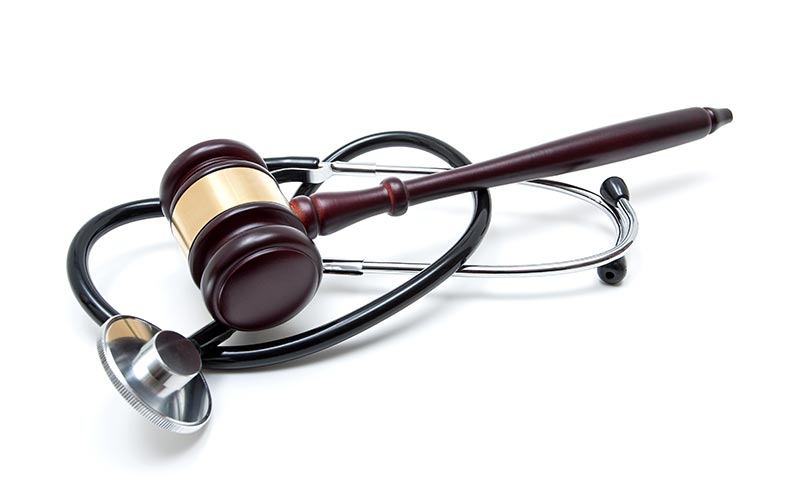
Things I Want You to Know About Malpractice Litigation
Some years ago, I saw a young woman in the course of my work. I cared for her in the way I do all my patients and discharged her home. She did not survive. This experience changed my life.
I practice and teach in the world of pediatric emergency medicine, and as you can imagine, I love babies, children, and young adults. When I learned that my patient had arrested at home, I was stunned. The feeling was not entirely unlike the moments in my life when I have received a phone call telling me someone I love has died; it is like an out-of-body sensation.
Not completely surprising, a lawsuit followed, ultimately resulting in a prolonged trial over 3 years later. This sequence of events challenged me at every level and changed my life. Some of the changes have been good, others have been just hard. Regardless, that period of my life was a watershed moment.
Both personally and professionally, my pain and isolation were immense. I had been in practice for over a decade at that point, and even though I have always been a reflective individual, in that period, I became more aware of the effects our professional experiences have on our hearts and minds. I fully realized their potential impact on the trajectory of our lives. As a result, I have become a student of these experiences and of their deepest meanings for us.
I am now a woman whose purpose it is to tear down the walls of isolation which arise inside and around physicians who confront unexpected, adverse patient outcomes and malpractice litigation. I devote many hours to creatively exploring and conveying the nuts and bolts of the litigation experience as well as the experience of the healer injured by an adverse patient outcome through writing, coaching, and public speaking. It touches me deeply to see tears rise in colleagues’ eyes when I teach, it shows clearly we’ve unlocked a door to physician healing.
I’ve said before (CLICK HERE) that this work brings to mind First Lady Betty Ford. In a day when people simply did not use the word “cancer” in polite company, her openness about her need for a mastectomy and her promotion of mammograms completely changed the world for those with breast cancer. Only now, roughly 45 years later, are we physicians getting around to breaking our silence around an experience that feels shameful to us. The time has come to do our own Betty Ford.
There are so many things I could tell you about the unexpected adverse outcomes and malpractice litigation overall. In this piece I’ll scratch the surface, I’ll give you what I consider my five essential insights, and if you’re interested in learning more, you can visit my blog. The fact of the matter is, you are much more likely to experience unexpected adverse outcomes and malpractice litigation than many of the rare medical disorders we all study. I, as a teacher, coach, and colleague, have five important things I want you to know.
1) It’s a Marathon
When I speak, coach, and write, I often compare the process of recovering from an adverse patient outcome and coping with malpractice litigation to running a marathon. It’s difficult and long. What sets it apart from other marathons, however, is that no one volunteers to run it, and no one can predict at the outset how many miles you’ll have to go. Sometimes, defendants are named and then dropped. A lawsuit may settle, go to trial, or rarely go on to appeal.
Because it is impossible to know at the outset whether your race will be a mini-marathon or one of those ultra-marathons through the Gobi Desert, it becomes essential that you focus on self-care. What do I mean by that? Eat right, get your sleep, drink more water and less alcohol and caffeine. Steer clear of illicit drugs, and don't attempt to fill a void of sadness with more work!
Do whatever you would if you were in fact about to run a hundred miles or more in the Gobi Desert.
2) When to Start Your Training
Bear in mind, successful marathon runners ideally do not begin their self-care and training regimen on the day the race begins. That approach generally results in injury. In the process of recovering from an adverse patient outcome and coping with malpractice litigation, injury often occurs, too. In fact, when these experiences go inadequately addressed, they are clearly associated with depression/anxiety, PTSD in practice, prematurely limiting the scope of one’s practice, early retirement, addiction, and physician suicide. These are not the outcomes you want for you, and most certainly not the outcomes I want for you!
You should ideally be in training well before race day ever comes. How do you do that? Begin now to understand the feelings involved with a stunning adverse outcome and why they happen. That way, when it happens to you or your friend, at least you’ll recognize what it is and that it is normal. You might also consider a few basics surrounding malpractice litigation so it is not completely unfamiliar ground.
Above all, take time with friends and loved ones. Raise a dog. Get out into nature, or into the arts or sports. Schedule a standing appointment for a massage twice a month, even if you are still in training or paying off student loans.
3) Do Not Run Alone
When your time to confront a distressing patient outcome or malpractice litigation comes, you’ll know it and you may be tempted to go into hiding. I’ve got one word of advice for you there, and it is this: “Don’t.”
Please do not hesitate to draw around yourself an appropriate coach, a psychologist, or a spiritual advisor. For many of us, these are big events. The stress is easily on the order of the loss of a loved one, a divorce, or a major illness.
Smart lawyers will advise you to speak to no one about the “details of the case” outside of legally protected contexts such as a Root Cause Analysis or other approved quality improvement activities. That advice is intended to protect you legally, not to endanger your health. Protecting you legally is at the heart of their role and bringing your case to the best possible closure legally is their proper aim.
Talking about the process, the emotions it engenders, and developing strategies and tools for managing them and caring for yourself, your loved ones, and your career over the course of the process does not constitute discussing the medical details of the case. It is important that you choose your confidant or confidants with care. However -- pardon me if I sound a little like a mom here -- I don’t want to see you facing this all alone.
4) What it Means to Win
For most marathoners, winning is not actually about winning, it is about finishing the race. Let that be true for you, too. I suggest you reframe the outcome. Let your goal be to finish with your conscience clean. If you do that, regardless of the legal outcome, my perspective is, you've won.
It is helpful to know that the legal world operates by very different rules compared to the world of medicine. If you feel like a fish out of water, that is simply because you are! Your defense lawyer's work is to prepare you to navigate the legal process truthfully and lawfully. Help them to do that by being open and honest with them.
I consider a malpractice defense lawyer to be like the poet Virgil in Dante’s Inferno. In no small part, their job is to lead you into the seven circles of hell, show you around a bit, and lead you right back out again! Read everything they request. Invite them to prepare you thoroughly. An excellent defense lawyer can help you come out on the other side of the legal process with your integrity in order. That is an invaluable prize!
5) You are a Real Runner
It can be so tempting to look at those colleagues who precede us and idolize them. I do it all the time. A few years ago, I took a position at the institution where I was trained, and let me tell you, some of the specialists who trained me are still demi-gods in my mind, even after two decades. It is moving to learn that some of the intelligent people I currently train feel the same way about me.
For now, I simply want to say to you that you are not all that different from me. It took courage for me to recover from an adverse patient outcome and survive malpractice litigation with my heart and mind intact, but it also took courage for me to take every step that led me to that moment from the first year of medical school right on down the line.
I never want to make light of real hardship, but I want you to know that it is possible to thrive and grow after an unforeseen patient outcome and litigation. I call this work I do “Thrive,” because research confirms what I have experienced firsthand; thriving is possible. It does not happen to everyone, but I was transformed in certain powerful ways by these events and am better for it.
If I could open any door for you, it would be the door to thriving. I encourage you to keep your heart and mind open to that possibility, keep an eye out for your path. I promise you, while you may not see it yet, it is there, waiting for you.
Dr. Stacia Dearmin is the founder and owner of Thrive: Insight, Education, Support, devoted to supporting the physician community around unexpected adverse outcomes and medical malpractice litigation. Find her blog at her website, thrivephysician.com Contact her there or follow her on Twitter and FB @thrivephysician. She also practices and teaches pediatric emergency medicine in northeast Ohio.
Stacia Dearmin, MD, Founder
Thrive: Insight, Education, Support



